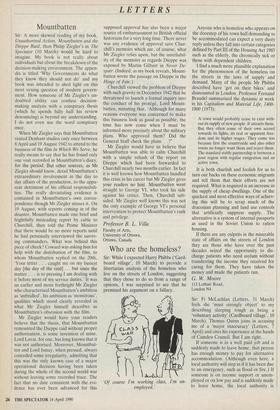Who are the homeless?
Sir: While I expected Harry Phibbs (`Gard- board village', 10 March) to provide a libertarian analysis of the homeless who live on the streets of London, suggesting that they chose to do so from a range of options, I was surprised to see that he premised his argument on a fallacy.
'Of course I'm working class, 'm un- employed.' Anyone who is homeless who appears on the doorstep of his town hall demanding to be accommodated can expect a very dusty reply unless they fall into certain categories defined by Part III of the Housing Act 1985 such as the elderly, the chronically sick or those with dependent children.
I find a much more plausible explanation for the phenomenon of the homeless on the streets in the laws of supply and demand. Many of the people Mr Phibbs described have 'got on their bikes' and dismounted in London. Professor Fernand Braudel summarised the dynamic at work in his Capitalism and Material Life, 1400- 1800 (1973): A town would probably cease to exist with- out its supply of new people. It attracts them. But they often come of their own accord towards its lights, its real or apparent free- dom and its higher wages. They come too because first the countryside and also other towns no longer want them and reject them. The standard stable partnership is between a poor region with regular emigration and an active town.
It is both churlish and foolish for us to turn our backs on these economic migrants and tell them that their efforts are not required. What is required is an increase in the supply of cheap dwellings. One of the quickest and most effective ways of achiev- ing this will be to scrap much of the draconian planning and land use controls that artificially suppress supply. The alternative is a system of internal passports as used in the Soviet Union to ration housing.
If there are any culprits in the miserable state of affairs on the streets of London they are those who have over the past decades seized the opportunity to dis- charge patients who need asylum without transferring the income they received for caring for them. They have taken the money and made the patients run.
G. W. Moore
113 Lothair Road, London N4


















































 Previous page
Previous page